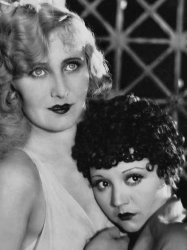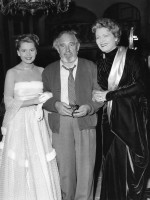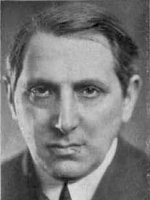María Corda est une Actrice Hongroise née le 4 mai 1898

María Corda (Mária Antónia Farkas, 4 May 1898 in Déva, Hungary (now Deva, Romania) – 15 February 1976 in Thônex, Switzerland) was a Hungarian actress and a star of the silent film era in Germany and Austria.
She began her acting career in the theatres of Budapest in the early days of World War I and soon after the break-up of Austria-Hungary she also began to work in the film industry. Her first role was in Se ki, se be (Neither in, nor out) in 1919, directed by the Hungarian director, Korda Sandor, who would come to be known as Alexander Korda. She married Sandor, who was then the leading director in Hungary's fledgling film industry, in 1919. He featured her in White Rose (1919), Ave Caesar! (1919) and A 111-es (1919) all of which he directed.
The young couple was affected by the turmoil in Hungary that followed the end of the Austro-Hungarian empire. For a brief time, Hungary was a badly-run democracy, then a Communist dictatorship, and finally - with the support of Western forces—a rightwing dictator, Miklos Horthy was put in place, the first of Europe's Fascist dictators and an authoritarian anti-Semite. Maria and Alexander had continued making films, no matter who was in power, with Maria as the most famous actress in Hungary and her husband its most important director.
However, her husband was grabbed by Horthy's secret police one day and vanished, Maria managed to get to her brother-in-law, Victor Korda, and between the two of them, they learned where Alexander was being held, in a Budapest Hotel which was notorious for having a torture chamber in its basement. Maria went to the British Military Mission, whose Brigadier was also on the board of Korda's film company and "with all the considerable passion at her disposal," as her nephew, Michael Korda, was to write in his biography of the family, convinced him that her husband must be freed or there would be an international scandal, one that would quite likely expose the British government's role in setting Horthy up as regent.
Her husband was freed and they then fled the country, relocating to Vienna, a logical choice since German was the second language of Hungary. This is where both changed their names, he to Alexander Korda and she, for obscure reasons, to "Maria Corda" - with a C.
In Vienna, he made her a star of the Austrian silent screen in epic films like Samson und Delila (1922) and Michael Curtiz's Die Sklavenkönigin (1924). Gli ultimi giorni di Pompei (1926) saw her take a leading role in an Italian film of a similar style.
In 1926 she and her husband moved to Berlin where their success as a team - he directing, Maria starring - soon won them enough attention that Maria was offered a contract by First National, a Hollywood studio, and her husband was signed, also, as a kind of package deal. They sailed to America that year, and settled in Beverly Hills.
Unfortunately, Maria could not duplicate her European success in Hollywood. She appeared in Korda's early productions there, most notably The Private Life of Helen of Troy (1927) but none of the films were very successful. Unfortunately, like many another silent film star of the day, her Hollywood career came to an abrupt end in 1928 with the coming of sound, since she had learned little English and what she did know was heavily accented. When his own contracts were up, Alexander availed himself of the liberality of California's divorce laws and divorced her, in a marriage that had been tempestuous for many years. He returned to Europe, first Paris but soon London, where he established himself as the center of British filmmaking for the next twenty-five years.
Maria moved to New York, where she wrote a number of novels. The later years of her life were spent in the vicinity of Geneva in Switzerland. When her ex-husband was knighted in 1942, Maria insisted that she should be called "Lady Korda," though Korda was remarried by that time, and after Korda's death she made several highly publicized attempts to assert herself as his widow and claim an inheritance, but these failed in the British courts, since by then her husband had married for a third time.
Korda had paid her a substantial alimony until his death in 1956. She had saved his life in Hungary, when she was a top European star who could not be refused, and he was a Hungarian Jew about to be disappeared. According to his nephew's biography, this prevented Alex "from ever breaking Maria's hold on him" despite his subsequent marriages.
Source : Wikidata
María Corda

- Infos
- Photos
- Meilleurs films
- Famille
- Personnages
- Récompenses
Nom de naissance Mária Antónia Farkas
Nationalité Hongrie
Naissance 4 mai 1898
Mort 15 février 1976 (à 77 ans) à Thônex (Suisse)
Nationalité Hongrie
Naissance 4 mai 1898
Mort 15 février 1976 (à 77 ans) à Thônex (Suisse)
She began her acting career in the theatres of Budapest in the early days of World War I and soon after the break-up of Austria-Hungary she also began to work in the film industry. Her first role was in Se ki, se be (Neither in, nor out) in 1919, directed by the Hungarian director, Korda Sandor, who would come to be known as Alexander Korda. She married Sandor, who was then the leading director in Hungary's fledgling film industry, in 1919. He featured her in White Rose (1919), Ave Caesar! (1919) and A 111-es (1919) all of which he directed.
The young couple was affected by the turmoil in Hungary that followed the end of the Austro-Hungarian empire. For a brief time, Hungary was a badly-run democracy, then a Communist dictatorship, and finally - with the support of Western forces—a rightwing dictator, Miklos Horthy was put in place, the first of Europe's Fascist dictators and an authoritarian anti-Semite. Maria and Alexander had continued making films, no matter who was in power, with Maria as the most famous actress in Hungary and her husband its most important director.
However, her husband was grabbed by Horthy's secret police one day and vanished, Maria managed to get to her brother-in-law, Victor Korda, and between the two of them, they learned where Alexander was being held, in a Budapest Hotel which was notorious for having a torture chamber in its basement. Maria went to the British Military Mission, whose Brigadier was also on the board of Korda's film company and "with all the considerable passion at her disposal," as her nephew, Michael Korda, was to write in his biography of the family, convinced him that her husband must be freed or there would be an international scandal, one that would quite likely expose the British government's role in setting Horthy up as regent.
Her husband was freed and they then fled the country, relocating to Vienna, a logical choice since German was the second language of Hungary. This is where both changed their names, he to Alexander Korda and she, for obscure reasons, to "Maria Corda" - with a C.
In Vienna, he made her a star of the Austrian silent screen in epic films like Samson und Delila (1922) and Michael Curtiz's Die Sklavenkönigin (1924). Gli ultimi giorni di Pompei (1926) saw her take a leading role in an Italian film of a similar style.
In 1926 she and her husband moved to Berlin where their success as a team - he directing, Maria starring - soon won them enough attention that Maria was offered a contract by First National, a Hollywood studio, and her husband was signed, also, as a kind of package deal. They sailed to America that year, and settled in Beverly Hills.
Unfortunately, Maria could not duplicate her European success in Hollywood. She appeared in Korda's early productions there, most notably The Private Life of Helen of Troy (1927) but none of the films were very successful. Unfortunately, like many another silent film star of the day, her Hollywood career came to an abrupt end in 1928 with the coming of sound, since she had learned little English and what she did know was heavily accented. When his own contracts were up, Alexander availed himself of the liberality of California's divorce laws and divorced her, in a marriage that had been tempestuous for many years. He returned to Europe, first Paris but soon London, where he established himself as the center of British filmmaking for the next twenty-five years.
Maria moved to New York, where she wrote a number of novels. The later years of her life were spent in the vicinity of Geneva in Switzerland. When her ex-husband was knighted in 1942, Maria insisted that she should be called "Lady Korda," though Korda was remarried by that time, and after Korda's death she made several highly publicized attempts to assert herself as his widow and claim an inheritance, but these failed in the British courts, since by then her husband had married for a third time.
Korda had paid her a substantial alimony until his death in 1956. She had saved his life in Hungary, when she was a top European star who could not be refused, and he was a Hungarian Jew about to be disappeared. According to his nephew's biography, this prevented Alex "from ever breaking Maria's hold on him" despite his subsequent marriages.
Ses meilleurs films
Le plus souvent avec
Filmographie de María Corda (20 films)
| Année | Nom | Métier | Rôle |
|---|---|---|---|
| 1930 | Die große Sehnsucht | Actrice | Elle-même |
| 1929 | Love and the Devil | Actrice | |
| 1928 | Tesha | Actrice | |
| 1927 | La Vie privée d'Hélène de Troie | Actrice | Hélène |
| 1927 | Une Dubarry moderne | Actrice | Toinette |
| 1926 | Der Gardeoffizier | Actrice | |
| 1926 | Madame ne veut pas d'enfants | Actrice | Elyane Parizot |
| 1926 | Les Derniers Jours de Pompéi | Actrice | Nydia |
| 1925 | Le Danseur de Madame | Actrice | Lucille Chauvelin |
| 1924 | Jedermanns Weib | Actrice | |
| 1924 | L'Esclave reine | Actrice | Merapi, The Moon of Israel |
| 1924 | Tragödie im Hause Habsburg | Actrice | Marie Vetsera |
| 1923 | Das unbekannte Morgen | Actrice | Stella Manners |
| 1922 | Herren der Meere | Actrice | |
| 1922 | Samson und Delila | Actrice | Julia Sorel / Delila, la femme d'Abimelech |
| 1922 | Eine versunkene Welt | Actrice | |
| 1920 | Number 111 | Actrice | Olga / Vera |
| 1919 | Ave Caesar! | Actrice | |
| 1919 | Neither at Home or Abroad | Actrice | |
| 1919 | Fehér rózsa | Actrice |
 Connexion
Connexion





